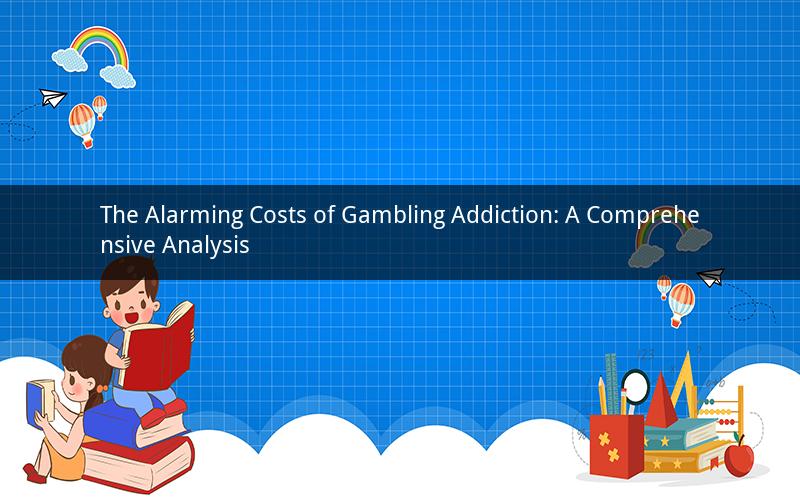
Introduction:
Gambling addiction is a growing concern in today's society, with millions of individuals falling victim to its detrimental effects. This article delves into the various costs associated with gambling addiction, including financial, psychological, social, and familial implications. By understanding the magnitude of these costs, we can better comprehend the urgency of addressing this issue.
I. Financial Costs
1. Loss of Income: One of the most immediate and apparent costs of gambling addiction is the loss of income. Individuals who are addicted to gambling often spend a significant portion of their earnings on betting, leaving them with little or no money for essential expenses.
2. Debt Accumulation: As the addiction intensifies, individuals may seek loans or credit cards to fund their gambling habits. This often leads to a cycle of debt, as they continue to borrow money to cover their losses.
3. Loss of Savings and Investments: Gamblers who are unable to control their addiction may deplete their savings and investments, leaving them financially vulnerable in the long run.
II. Psychological Costs
1. Emotional Distress: Gambling addiction can lead to severe emotional distress, including feelings of guilt, shame, and depression. The constant pursuit of winning can take a toll on an individual's mental well-being.
2. Anxiety and Stress: The fear of losing money and the constant pressure to recover previous losses can contribute to heightened anxiety and stress levels.
3. Impaired Cognitive Function: Chronic gambling can affect an individual's cognitive abilities, including memory, concentration, and decision-making skills.
III. Social Costs
1. Relationship Strain: Gambling addiction can strain relationships with family members, friends, and colleagues. The individual may become isolated, as their addiction takes precedence over social interactions.
2. Loss of Employment: In some cases, gambling addiction may lead to job loss due to poor performance or frequent absences caused by the need to gamble.
3. Social Exclusion: Individuals with gambling addiction may find themselves excluded from social activities and events, further isolating them from their support networks.
IV. Familial Costs
1. Financial Burden: The financial consequences of gambling addiction can extend to the individual's family members. They may bear the burden of paying off debts or supporting the addicted individual financially.
2. Emotional Toll: Family members often experience emotional distress, including guilt, anger, and sadness, as they watch their loved one struggle with addiction.
3. Divorce and Separation: In some cases, gambling addiction can lead to the breakdown of marriages and families, causing long-lasting damage.
V. Societal Costs
1. Healthcare Costs: The psychological and physical health consequences of gambling addiction can lead to increased healthcare costs, including mental health treatment and medical expenses related to substance abuse.
2. Loss of Productivity: Individuals with gambling addiction may experience a decline in productivity, impacting the overall economy.
3. Crime and Illegal Activities: In some instances, individuals with gambling addiction may resort to illegal activities, such as theft or fraud, to fund their habits, leading to increased crime rates.
FAQs:
Q1: How can gambling addiction be identified in someone?
A1: Signs of gambling addiction include hiding betting activities, borrowing money to gamble, feeling restless or irritable when unable to gamble, and prioritizing gambling over other responsibilities.
Q2: What are some effective treatments for gambling addiction?
A2: Effective treatments for gambling addiction include cognitive-behavioral therapy, support groups, and medication for co-occurring mental health disorders.
Q3: Can gambling addiction be cured completely?
A3: While gambling addiction is a chronic condition, it can be managed and controlled with proper treatment and support.
Q4: How can family members help someone struggling with gambling addiction?
A4: Family members can help by offering support, encouraging the individual to seek treatment, and being patient throughout the recovery process.
Q5: Is it possible to prevent gambling addiction?
A5: While it is not possible to prevent gambling addiction entirely, individuals can reduce their risk by being aware of the signs and symptoms, setting limits on gambling activities, and seeking help if they feel they are developing an addiction.
Conclusion:
The costs of gambling addiction are multifaceted, affecting individuals, families, and society as a whole. Understanding the magnitude of these costs can serve as a wake-up call to address this issue effectively. By promoting awareness, providing accessible treatment options, and supporting individuals in recovery, we can work towards reducing the devastating impact of gambling addiction.